Funny Girl Im the Greatest Star Monologue
| | ||
| | | |
 | Funny Girl (1968) Aspiring, gifted rags-to-riches performer Fanny Brice (Barbra Streisand) was seen in flashback, singing "I'm the Greatest Star." She was trying to convince others, through song, clever words and acting, that she was going to be the next big star even though she wasn't one of the "beautiful girls." They showed her the door:
|   |
 | If... (1968, UK) Director Lindsay Anderson's British coming-of-age social drama examined the rebellious nature of three anti-authoritarian students at a conformist British public school (a symbolic microcosm of a repressive Establishment-oriented society). The three: Mick Travis (Malcolm McDowell), Johnny Knightly (David Wood), and Wallace (Richard Warwick) were reprimanded by the Headmaster (Peter Jeffrey) in his office for insubordination during cadet field corps paramilitary training exercises in the woods. The three recalcitrant boys were first told to apologize to the chaplain for having attacked him. The chaplain's body was withdrawn from a morgue-like drawer behind him (a very surreal scene)! Then, they were forced to listen to the Headmaster's speech that strained to be reasonable - with a 'punishment' that was called a "privilege" and an "opportunity" - to clean up the church basement on the weekend:
| 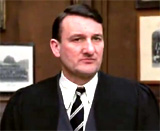 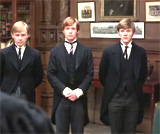 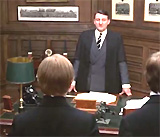 |
 | The Lion in Winter (1968, UK) Play clip (excerpt): In the year 1183, Eleanor of Aquitaine's (Katharine Hepburn) annoyed, despairing lecture to her sons about the origins of war -- and peace, and how humans were barbarians:
|  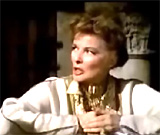 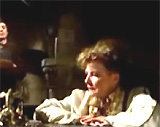 |
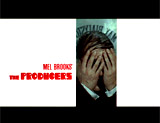 | The Producers (1968) In the late 1960s, failed and aging Broadway producer Max Bialystock (Zero Mostel) made a proud yet despairing declaration of his former greatness and wealth to timid accountant Leo Bloom (Gene Wilder):
Then at the window after rubbing it clear with his drink, he spotted a chauffeured white Rolls Royce parking outside Kippys restaurant across the street, and gleefully yelled in admiration and jealousy:
| 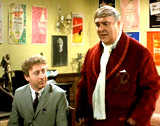 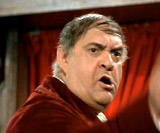 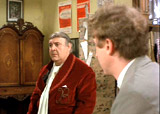 |
 | The Producers (1968) Over schnapps in his apartment, insane and deranged ex-Nazi Franz Leibkind (Kenneth Mars), author of the play Springtime For Hitler - that Max Bialystock (Zero Mostel) wanted to produce on Broadway, had glowing, nostalgic memories of Adolf Hitler and only scorn for British prime minister Winston Churchill:
| 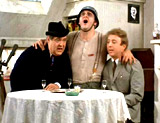 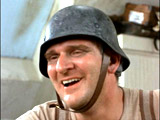 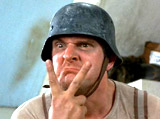 |
 | The Producers (1968) Co-producer/accountant Leo Bloom (Gene Wilder), on-trial partner Max Bialystock (Zero Mostel), and crazed ex-Nazi Franz Leibkind (Kenneth Mars) conspired to blow up the theatre to end their production of Springtime For Hitler. After the jury found all of them "incredibly guilty," Bloom had the opportunity to give an impassioned "Whom has he really hurt?" defense, before the judge pronounced their sentence:
Max stood and tacked on his own final words:
The trio were sent to the State Penitentiary, where they hadn't learned their lesson. | 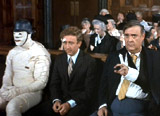 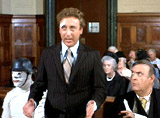 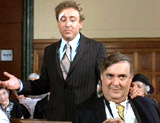 |
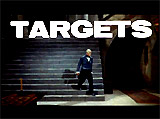 | Targets (1968) Elderly horror film star Byron Orlok's (Boris Karloff in a semi-autobiographical role) beautiful narrated recounting of the folk fable 'The Appointment in Samarra' to his radio interviewers, as the camera slowly zoomed in. He related the story of a man who had an appointment with mortality and couldn't escape his fate:
|  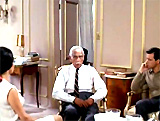 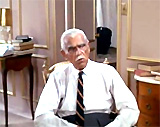 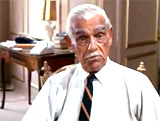 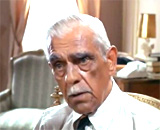 |
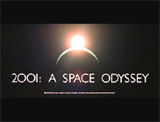 | 2001: A Space Odyssey (1968, UK) Malevolent super-computer HAL's (voice of Douglas Rains) slow death, ending with the singing of Daisy. The sequence began as angered astronaut Dave Bowman (Keir Dullea) - with the sounds of his heavy breathing inside his helmet - strode towards the computer's reddish-toned "brain room" to remove parts of the computer's memory bank and shut the computer down. HAL began to plead for him to reconsider, and asked him to calm down and reassess the situation:
As Dave started to de-brain, lobotomize, dismantle and disconnect HAL's higher-logic functions, HAL continued to plead and protest with Bowman - in a programmed voice - as his 'mind' gradually decayed and he became imbecilic and returned to infancy. HAL's poignant death was agonizingly slow and piteous, and although the computer maintained a calm tone - it still expressed a full range of genuine emotions while dying. His voice eventually slowed and sounded drugged:
When HAL's brain reached senility, and then a second childhood, he called up his earliest encoded data-memories as physical parts of his mind were pulled away:
HAL then sang his swan song, one of the first songs he learned - Daisy, or A Bicycle Built For Two - until the words entirely degenerated with his voice rumbling lower and lower into distortion. He slid into his innate tabula rasa state - and then there was utter silence:
| 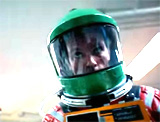  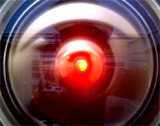 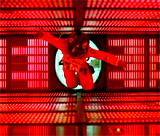    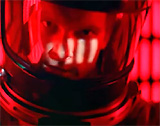 |
   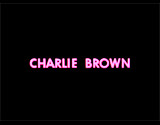 | A Boy Named Charlie Brown (1969) Linus van Pelt's (voice of Glenn Gilger) simple, wise observation to a bedridden, shamed Charlie Brown (voice of Peter Robbins), who had failed the National Spelling Bee:
|  |
Source: https://www.filmsite.org/bestspeeches23.html

0 Response to "Funny Girl Im the Greatest Star Monologue"
Post a Comment